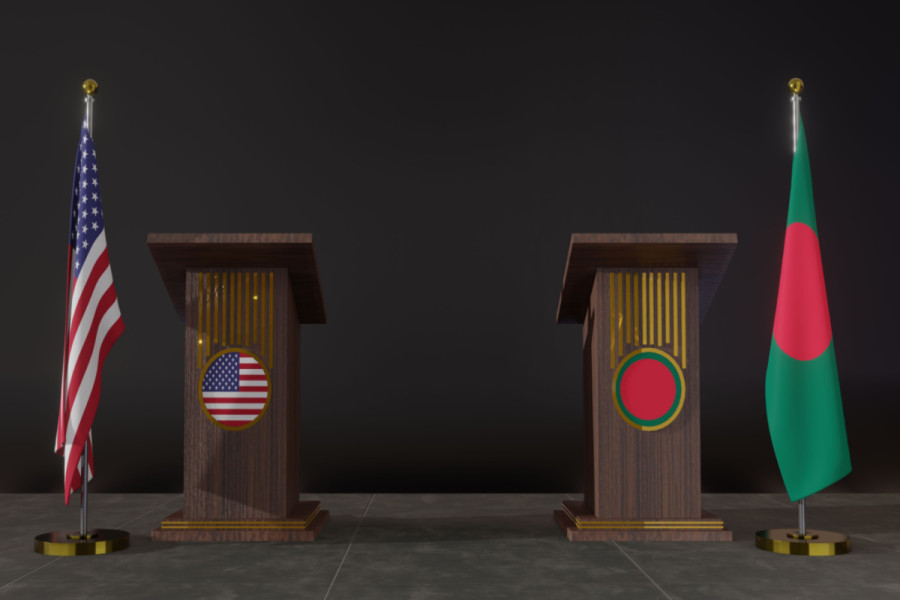Columns
Dhaka and the geopolitical game
Bangladesh-US ties have been problematic since Sheikh Hasina assumed power in 2009.
Smruti S Pattanaik
Bangladesh has recently been in the international news due to high-profile visits from the United States and China as geopolitics surrounding the Indo-Pacific gains momentum. Both the US National Security Council’s Senior Director for South Asia, Rear Admiral Eileen Laubacher, and Assistant Secretary of State for South and Central Asian Affairs, Donald Lu, visited Dhaka in January. In between these two visits, there was a “midnight visit” by Qin Gang, the new foreign minister of China, which Beijing described as a “technical stopover” for refuelling ostensibly on his way to Africa.
For quite some time, Bangladesh has been drawing the attention of both the US and China. While there are rumours that Dhaka is being courted by the US to be an Indo-Pacific partner, China has been trying to prevent that. Therefore, it was not surprising that when China’s Ambassador to Bangladesh Li Jiming warned Dhaka against joining the Indo-Pacific as its relations with China would be “substantially damaged”, it created an uproar in there. In a newspaper article, the Chinese ambassador charged that both the US and India had been advising Bangladesh to move away from China.
Rapprochement in the making
Bangladesh is in a geopolitical hotspot. The next parliamentary election is due in early January, and it is walking a geopolitical tightrope. Though relations with the US have soured because of the sanctions against the top officers of the Rapid Action Battalion for human rights violations and disappearances, and Bangladesh's being left out of President Biden’s democracy summit in 2021, the two governments have been attempting to mend fences. It is also true that after the US imposed sanctions against the Rapid Action Battalion, the number of disappearances and arrests of media persons under the draconian Digital Security Act have dropped significantly. The US would like to contain China, and Bangladesh wants to keep the US on its side as the opposition has been campaigning for free and fair elections since last August.
Moreover, the US is a top destination for Bangladesh's readymade garments, and both governments are working for the restoration of the generalised system of preferences (GSP) which was suspended after the Rana Plaza tragedy as Bangladesh could not meet the US statutory eligibility requirements related to worker rights. Lu’s visit to Dhaka also revealed a softening of the US stance on human rights abuses as he clearly mentioned an improvement in the human rights situation even though the sanctions against the Rapid Action Battalion would remain. This statement has created space for the two governments to take a relook at their relations. Therefore it is not surprising that Bangladesh did not allow a sanctioned Russian ship carrying equipment for its Rooppur nuclear power plant to dock at Mongla Port. Be that as it may, the fact is that Bangladesh has been careful about its relations with Russia and has decided to import cheap energy through a third country.
Bangladesh's relationship with the US has been problematic since Sheikh Hasina assumed power in 2009. It began with differences over Hasina’s treatment of Nobel laureate Mohammad Yunus over his political ambition. Following the one-sided 2014 election, the US had called for a re-election, and it only changed its stance after the 2015 violence unleashed by the opposition party in which more than 100 people were burnt alive by a petrol bomb. In 2018, the US congratulated Hasina when she won her third term as prime minister. However, it is surprising that the US has started to put pressure on Bangladesh to hold free and fair elections next year. While the opposition welcomes the US pressure, the ruling party knows it can withstand it only with the help of China and India.
Over the past few years, the US has been following a carrot-and-stick policy. In January 2021, the then US Secretary of State Mike Pompeo’s statement that Bangladesh was an al-Qaeda hub elicited a strong rebuttal from Dhaka. There have been several high-level visits to Bangladesh by US officials, and there have been consultations at the highest level over several issues, mainly combating terrorism. Last December, the US Deputy Assistant Secretary in the Bureau of South and Central Asian Affairs, Afreen Akhter, called Bangladesh an important strategic partner. The US also condemned the genocide of Rohingya refugees in Myanmar—a stance that helped Dhaka to highlight the atrocities and the resultant refugee burden on Bangladesh.
Bangladesh and Indo-Pacific
The US policy of containing China has made it careful in its pronouncements. As Lu’s visit has demonstrated, the US does not want to pressurise Dhaka over its record on human rights and democracy. Though Dhaka has been extremely careful about its stance on the Indo-Pacific, speculation is rife about the probability of its joining the Indo-Pacific, and thereby augmenting its geostrategic position and emerging as an important player to protect its interest. The US has been trying to bring Dhaka to its side by urging it to collaborate on the Indo-Pacific Strategy as well as join the Indo-Pacific Economic Framework.
US Deputy Secretary of State, Stephen Biegun, during his visit to Dhaka in October 2020, assured his hosts that this strategy was not aimed against any country. Dhaka has kept its options open, and Foreign Minister Abul Kalam Abdul Momen has said it is analysing such a possibility and the benefits it will bring to the country. Unveiling the Indo-Pacific Strategy, the US said, “Building a balance of influence in the world that is maximally favourable to the United States, our allies and partners, and the interests and values we share.” In April last year, Victoria Nuland visited Dhaka and the two countries signed a draft defence cooperation agreement.
It would be important to note how the US approaches the government in Bangladesh. It has conducted significant counter-terror cooperation with Dhaka, and has always showcased Bangladesh as a moderate Muslim country. This was the position it took when the Bangladesh Nationalist Party and the four-party alliance government were in power. This position has not shifted. At the same time, it is aware of China’s increasing influence in the neighbourhood, and knows that it needs to partner with the countries of the region. India is part of the Quadrilateral Security Dialogue. Most of the countries in the region are cautious about adopting a “containment” strategy against China, and except for India and Bhutan, are part of the Belt and Road Initiative. But not all the countries in South Asia have been successful in balancing their relationship with the three major players in the region—India, China and the US. Bangladesh is the only country with the distinction of managing the diverse interests of the external players and coming out unscathed in the geopolitical game.




 11.84°C Kathmandu
11.84°C Kathmandu















